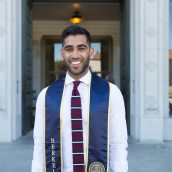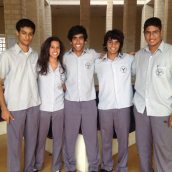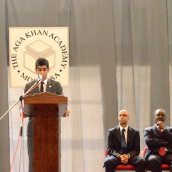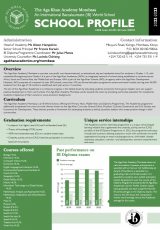Rahim Daya (Class of 2013): Grateful for a balanced education
Growing up in London, England I had no idea that I would owe my intellectual and character development to the dynamic academic and residential programmes at the Aga Khan Academy Mombasa.
I was aware of the work of the Aga Khan Development Network and their efforts to improve the quality of life of communities across the globe, but little more. After moving from London to Moscow at age 12, my parents urged me to consider the programme at the Aga Khan Academy Mombasa, a school 5000 miles away. I was taken aback. Why did they want to send me away? I didn’t mean to knock over the photo frame while kicking around the soccer ball the other day. As I began to read about the Academies and their vision to create leaders, I became excited at the prospect of being part of a rigorous academic programme while having the opportunity to engage in the numerous extra-curricular activities the Academy in Mombasa had to offer.
I was one of the first members of the boarding component of the Academy and, as a result, I saw the programme grow from about 30 students living in two blocks to almost 200 across six blocks. Despite the growth, residential students remained a tight-knit community where younger students felt comfortable interacting with student several grades above them. The commitment to serve the community was of the upmost importance within residential life at the Academy. I recall taking part in cleaning Mama Ngina Drive, the street that ran adjacent to the school, as well as numerous beach clean ups, painting a local madrasa and facilitating a de-worming programme in Bombolulu to name a few. Students were also given the freedom to create their own community service projects. I was a part of a project called Your Environmental Voice, an organisation that aimed to create awareness of environmental issues and undertake initiatives to curb unnecessary pollution in Mombasa. Projects like these allowed for students to lead and take ownership of projects that made a difference in the lives of those around us.
Within the residential programme, I recall the efforts of teachers like Mr. Bernard Dudi – my dorm parent for the majority of my time at the Academy – and others who went out of their way to ensure that students quickly settled into the Academy. Teachers’ doors were always open for a quick chat on academics, current affairs and future plans as well as the results from the previous nights’ Champions League football. In holding the position of dorm captain within the residential community and representing the community on the student council, I was entrusted with a leadership role within residential life that involved organising and facilitating orientation programmes for new students. In addition, dorm captains arranged activities for students on the weekends and liaised with students and teachers to improve the boarding experience for all. Leadership roles like this gave me my first taste of managing projects and people and I continue to draw on these experiences today.
Being a part of and leading the Model United Nations club at the Academy in Mombasa was an experience that I hold most dear. At first, the thought of public speaking and writing resolutions to combat real local, regional and international problems was intimidating enough for me to turn a blind eye to joining the club. However after encouragement from teachers and peers, it wasn't long before I began to gain confidence in addressing long hundreds of fellow delegates without needing to read off a script or feel my legs wobble. Through attending conferences as well as teaching others the skills needed to be a successful delegate, I was tasked with analysing and working with others to construct creative solutions to tackle issues concerning poverty reduction including food security; the prevalence of quality educational institutions; access to clean water and sanitation. These experiences allowed me to begin to comprehend the multiple complexities to a single issue and the ethical responsibility we carry to do all in our power to promote sustainable progress in less privileged communities.
I was particularly challenged by the rigor of the IB Diploma Programme – I quickly learnt that it is essential for students to be able to think independently and work hard to engage with thought provoking course work. Studying six different subjects as well as Theory of Knowledge and writing a 4000-word essay on a chosen topic was a heavy load to bear. Crucially, there was a willingness and determination among the student body to study in groups and push one another to achieve challenging objectives. There was no shame in going to a classmate or more senior students to ask for help and this was in fact commonplace. I think that the challenge of the IB diploma was made much easier by the effort to work together among students. The teachers at the Academy were invaluable in the process as they guided students to reach the academic goals and encouraged students to think outside the box. Their collective love for teaching and determination to see students succeed allowed for the attainment of consistently high grades and development of a passion for learning that continues to drive Academy alumni today.
As I reflect on my time at the Academy and turn an eye to the future it is my hope that I will be able to return to the African continent and help to contribute to the progress being made today. Graduating with a liberal arts education from UC Berkeley and focusing on Political Economy from an African lens has cemented the responsibility I feel to give back to communities and help improve the lives of those troubled by poverty, unemployment and poor governance. Not only did my time at the Academy help me gain admission to a top university but it helped me to grow to be the man I am today by instilling values of social conscience and intellectual curiosity that I continue to hold precious today.
By Rahim Daya








